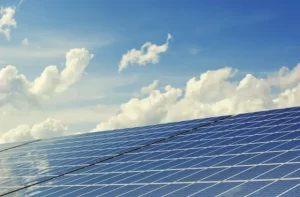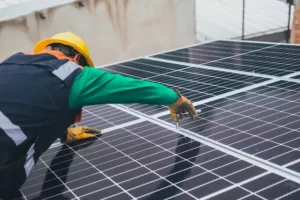When considering solar panels for your home, you might be wondering: how much do solar panels weigh? The weight of solar panels can vary depending on several factors, and understanding these nuances is crucial for a successful installation. From the average weight of solar panels to the impact of dimensions on their weight, each aspect plays a significant role in the overall equation. Stay tuned to discover how these factors can influence your decision-making process and ensure a safe and efficient installation on your property.
Key Takeaways
- Solar panel weight varies by size and material composition.
- Installation weight capacity crucial for structural integrity.
- Consider roof safety and capacity before solar panel installation.
- Advancements in materials reduce panel weight without sacrificing durability.
Average Weight of Solar Panels
When installing solar panels, it is important to consider that their average weight typically ranges from 40 to 50 pounds per panel. This weight distribution is crucial for transport logistics and structural support. Before installation, it is essential to plan for the weight of each panel to ensure proper mounting considerations are met.
Transport logistics play a significant role in handling solar panels due to their weight. Panels should be transported securely to prevent damage and ensure safe delivery to the installation site. Proper packaging and handling procedures must be followed to maintain the integrity of the panels during transit.
Structural support is another key aspect to consider when dealing with the weight of solar panels. Mounting the panels on a sturdy framework that can support the combined weight of all panels is essential for the system's longevity and performance. Adequate support structures will prevent any structural damage and ensure the panels are securely in place for optimal energy production.
Impact of Panel Dimensions on Weight
Considering the impact of panel dimensions on weight, it is crucial to understand how variations in size can directly influence the overall weight of solar panels. Here are some key points to consider:
- Panel Efficiency: Larger solar panels tend to have higher power output due to increased surface area for capturing sunlight. However, this increase in efficiency often comes with a trade-off of higher weight.
- Structural Support: The size of a solar panel can impact the structural requirements for installation. Larger panels may need sturdier mounting systems to support their weight and withstand external factors like wind loads.
- Material Composition: The materials used in the construction of solar panels can vary based on size. Larger panels may require denser or additional materials to maintain durability and efficiency, contributing to a higher overall weight.
- Transportation and Installation: Larger and heavier solar panels may require specialized equipment for transportation and installation, adding to the logistical considerations and costs.
Considerations for Installation Weight
To assess the impact of installation weight, it is essential to evaluate the structural load capacity of the mounting system. Installation constraints such as roof type, angle, and material must be considered to ensure the weight of the solar panels is adequately supported. Weight distribution plays a crucial role in determining the stress placed on the mounting system and the roof structure. Improper weight distribution can lead to structural damage over time.
When planning the installation of solar panels, it is vital to consult with a structural engineer or a professional installer to determine the maximum weight that can be safely accommodated by the mounting system and the roof. Factors such as wind and snow loads should also be taken into account when assessing the overall weight capacity.
Importance of Roof Safety and Capacity
Assessing the roof's safety and capacity is critical in ensuring proper support for solar panel installations. When considering the weight of solar panels, it's essential to evaluate the structural integrity of your roof and its ability to withstand the additional load. Here are some key points to keep in mind:
- Roof Safety: Prioritize safety by ensuring that your roof can bear the weight of the solar panels without compromising the overall structure.
- Weight Capacity: Determine the maximum weight that your roof can support to avoid any potential damage or hazards.
- Structural Assessment: Conduct a thorough inspection of your roof to identify any weak spots or areas that may require reinforcement.
- Professional Consultation: Seek advice from a structural engineer or solar panel installer to assess the roof's capacity accurately.
Materials Affecting Solar Panel Weight
Solar panel weight is influenced significantly by the materials used in their construction. The frame design plays a crucial role in determining the overall weight of a solar panel. Lighter frame materials, such as aluminum alloys, can reduce the weight of the panel without compromising structural integrity. Efficiency is also a key factor to consider when discussing materials affecting solar panel weight. Technological advancements have led to the development of thinner and lighter photovoltaic layers that contribute to reducing the overall weight of the solar panel while maintaining high efficiency levels.
Moreover, the durability of the materials used in solar panels is essential for ensuring longevity and performance. Choosing materials that are both lightweight and durable can lead to a more sustainable and reliable solar panel system. Manufacturers are constantly innovating to create materials that are not only efficient but also lightweight, to address the weight concerns associated with solar panel installations. By considering frame design, efficiency, technological advancements, and durability in the selection of materials, you can optimize the weight of solar panels for your specific needs.
Frequently Asked Questions
Can the Weight of Solar Panels Cause Damage to My Roof Over Time?
Over time, the weight of solar panels can potentially cause damage to your roof if not properly distributed. To prevent roof damage, ensure the panels are installed correctly with a focus on stability and weight distribution.
Are There Any Weight Restrictions for Installing Solar Panels on Certain Types of Roofs?
When considering installing solar panels on your roof, it's crucial to check weight restrictions. Different roofing materials have varying load capacities. Ensure safety by verifying that your roof can support the weight of solar panels without causing damage.
How Does the Weight of Solar Panels Impact the Structural Integrity of a Building?
When considering the weight of solar panels, you must prioritize building safety and structural impact. The installation process and maintenance concerns play a crucial role in ensuring the structural integrity of your building remains intact.
Are There Any Additional Costs Associated With Reinforcing a Roof to Support the Weight of Solar Panels?
When considering roof reinforcement for solar panels, it's crucial to conduct a cost analysis. Ensuring installation safety and proper weight distribution are paramount. Evaluate any additional expenses associated with reinforcing your roof to support solar panel installations.
What Precautions Should Be Taken to Ensure the Safety of Installers and Homeowners When Dealing With the Weight of Solar Panels During Installation or Maintenance?
To ensure safety during solar panel installation or maintenance, follow these precautions: use proper lifting techniques, wear appropriate gear, secure panels in place, inspect support structures, and follow installation guidelines. Safety measures are crucial for all involved.
Conclusion
When considering solar panel weight, it is crucial to take into account the dimensions, materials, and installation requirements. The average weight of solar panels can vary depending on these factors, impacting the overall load on your roof. Ensuring that your roof is structurally sound and can support the weight of the panels is essential for a safe and successful solar installation. Choose wisely to maximize efficiency and minimize risks.



